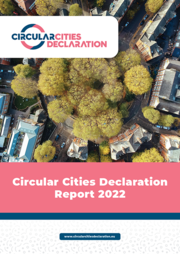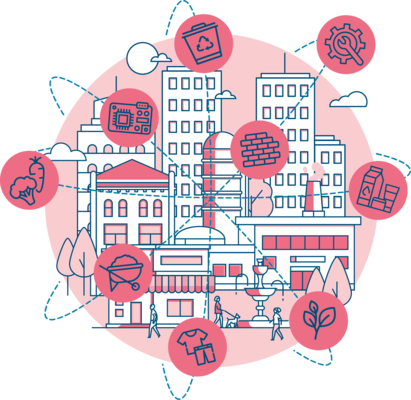CCD Report 2024
We are excited to announce the release of the CCD Report 2024, the most comprehensive record offering a unique insight into the implementation of the circular economy across European cities.
In the summer of 2023, signatories of the Circular Cities Declaration (CCD) were asked to report on their progress in transitioning towards a circular economy. As a result, the CCD Report 2024 “Insights on implementation, measurement, and nature” features contributions from 54 cities and metropolitan areas, representing 16 million inhabitants.
The report provides a detailed overview of the strategies and actions implemented in each contributing city. In addition to the pages dedicated to the signatories, readers will find perceptive analyses from ICLEI Europe, the Ellen MacArthur Foundation, and Circle Economy, unveiling the main trends and key priority actions to accelerate the transition to a circular way of living. Furthermore, the report includes in-depth chapters on how cities are measuring progress and leveraging the circular economy to regenerate nature. We hope you enjoy reading!
Signatories featured in the report
Bruges, Ghent, Leuven, Liège, Mechelen and Temse (Belgium); Capital Region of Denmark, Copenhagen and Høje-Taastrup (Denmark); Espoo, Helsinki, Lappeenranta, Mikkeli, Oulu, Tampere and Turku (Finland); Est Ensemble Grand Paris (France); Frankfurt am Main and Freiburg im Breisgau (Germany); Budapest (Hungary); Fingal (Ireland); Florence, Genoa and La Spezia (Italy); Esch-sur-Alzette and Wiltz (Luxembourg); Bergen, Bodø, and Oslo (Norway); Águeda, Albergaria-a-Velha, Braga, Évora, Guimarães, Loures, Mangualde, Matosinhos, Porto, Torres Vedras and Valongo (Portugal); Ljubljana and Maribor (Slovenia); Manresa, Rivas Vaciamadrid, Valladolid and Vallès Occidental (Spain); Eskilstuna and Malmö (Sweden); Zürich (Switzerland); Haarlem and Rotterdam (The Netherlands); İzmit (Türkiye); Glasgow and London Borough of Newham (United Kingdom)
Become a Signatory!
Does your city or region wish to contribute to future reports? Sign the Circular Cities Declaration!
Email us here: info@circularcitiesdeclaration.eu
Key Insights
The CCD Report 2024 features introductory chapters curated by experts from ICLEI Europe, the Ellen MacArthur Foundation, and Circle Economy. The team analysed the reports submitted by the signatories to assess their progress against the CCD commitments and identify the main challenges faced by cities in their path towards a circular future. Here is what they discovered:
- Cities are clearly implementing and embedding circular economy principles and roadmaps successfully through a wide range of activities.
- Cities are prioritising progress on circular economy measurement and reporting to support their strategic decision making and transition plans.
- Cities are beginning to realise the untapped potential of the circular economy for regenerating nature.
- Cities are harnessing the potential of the circular economy to achieve climate goals, as well as build resilience and enable a just transition.
Download the report to explore how cities can accelerate the circular transition and learn more on the resources available to support them.



